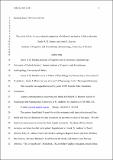Files in this item
The circle of life : a cross-cultural comparison of children's attribution of life-cycle traits
Item metadata
| dc.contributor.author | Burdett, Emily Rachel Reed | |
| dc.contributor.author | Barrett, Justin L | |
| dc.date.accessioned | 2018-01-01T00:31:37Z | |
| dc.date.available | 2018-01-01T00:31:37Z | |
| dc.date.issued | 2016-06 | |
| dc.identifier | 240223846 | |
| dc.identifier | 4ad2cbc0-2a4e-4669-9be1-f92d0ed7db51 | |
| dc.identifier | 84953260280 | |
| dc.identifier | 000375765700009 | |
| dc.identifier.citation | Burdett , E R R & Barrett , J L 2016 , ' The circle of life : a cross-cultural comparison of children's attribution of life-cycle traits ' , British Journal of Developmental Psychology , vol. 34 , no. 2 , pp. 276-290 . https://doi.org/10.1111/bjdp.12131 | en |
| dc.identifier.issn | 0261-510X | |
| dc.identifier.uri | https://hdl.handle.net/10023/12400 | |
| dc.description | This research was supported in part by grant 12682 from the John Templeton Foundation. | en |
| dc.description.abstract | Do children attribute mortality and other life-cycle traits to all minded beings? The present study examined whether culture influences young children's ability to conceptualize and differentiate human beings from supernatural beings (such as God) in terms of life-cycle traits. Three-to-5-year-old Israeli and British children were questioned whether their mother, a friend, and God would be subject to various life-cycle processes: Birth, death, ageing, existence/longevity, and parentage. Children did not anthropomorphize but differentiated among human and supernatural beings, attributing life-cycle traits to humans, but not to God. Although 3-year-olds differentiated significantly among agents, 5-year-olds attributed correct life-cycle traits more consistently than younger children. The results also indicated some cross-cultural variation in these attributions. Implications for biological conceptual development are discussed. | |
| dc.format.extent | 15 | |
| dc.format.extent | 1004663 | |
| dc.language.iso | eng | |
| dc.relation.ispartof | British Journal of Developmental Psychology | en |
| dc.subject | Cognitive development | en |
| dc.subject | Folk biology | en |
| dc.subject | Cultural learning | en |
| dc.subject | Cross-cultural comparisons | en |
| dc.subject | Naïve biology | en |
| dc.subject | Reasoning | en |
| dc.subject | Anthropomorphism | en |
| dc.subject | RC0321 Neuroscience. Biological psychiatry. Neuropsychiatry | en |
| dc.subject | BF Psychology | en |
| dc.subject | NDAS | en |
| dc.subject | SDG 3 - Good Health and Well-being | en |
| dc.subject.lcc | RC0321 | en |
| dc.subject.lcc | BF | en |
| dc.title | The circle of life : a cross-cultural comparison of children's attribution of life-cycle traits | en |
| dc.type | Journal article | en |
| dc.contributor.institution | University of St Andrews. School of Psychology and Neuroscience | en |
| dc.identifier.doi | https://doi.org/10.1111/bjdp.12131 | |
| dc.description.status | Peer reviewed | en |
| dc.date.embargoedUntil | 2017-12-31 |
This item appears in the following Collection(s)
Items in the St Andrews Research Repository are protected by copyright, with all rights reserved, unless otherwise indicated.

